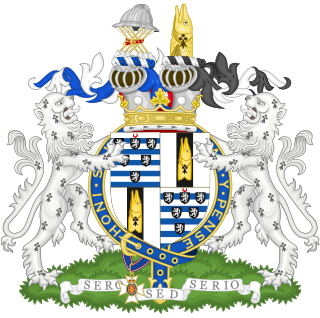Related Research Articles

Marquess of Salisbury is a title in the Peerage of Great Britain. It was created in 1789 for the 7th Earl of Salisbury. Most of the holders of the title have been prominent in British political life over the last two centuries, particularly the 3rd Marquess, who served three times as Prime Minister in the late 19th and early 20th centuries.

Cecil Edward Parkinson, Baron Parkinson, was a British Conservative politician and cabinet minister. A chartered accountant by training, he entered Parliament in November 1970, and was appointed a minister in Margaret Thatcher's first government in May 1979. He successfully managed the Conservative Party's 1983 election campaign, and was rewarded with an appointment as Secretary of State for Trade and Industry, but was forced to resign after revelations that his former secretary, Sara Keays, was pregnant with his child, whom she later bore and named Flora Keays.

Edgar Algernon Robert Gascoyne-Cecil, 1st Viscount Cecil of Chelwood,, known as Lord Robert Cecil from 1868 to 1923, was a British lawyer, politician and diplomat. He was one of the architects of the League of Nations and a defender of it, whose service to the organisation saw him awarded the Nobel Peace Prize in 1937.
Baron Rockley, of Lytchett Heath in the County of Dorset, is a title in the peerage of the United Kingdom. It was created on 11 January 1934 for the Conservative politician Sir Evelyn Cecil, who had earlier represented Hertfordshire East, Aston Manor and Birmingham Aston in the House of Commons. He was the son of Lord Eustace Cecil, fourth son of James Gascoyne-Cecil, 2nd Marquess of Salisbury. The first baron was married to the horticulturist Alicia Amherst. As of 2019 the title is held by their great-grandson, the fourth baron, who succeeded his father in 2011.

The 1941 British Columbia general election was the twentieth general election in the Province of British Columbia, Canada. It was held to elect members of the Legislative Assembly of British Columbia. The election was called on September 9, 1941, and held on October 21, 1941.
The Municipal Reform Party was a local party allied to the parliamentary Conservative Party in the County of London. The party contested elections to both the London County Council and metropolitan borough councils of the county from 1906 to 1945.
Air Commodore John Allan Cecil Cecil-Wright AFC, born John Allan Cecil Wright, was a British Royal Air Force officer and Conservative Party politician.
A by-election was held in Hitchin constituency in 1911 to fill a vacancy in the House of Commons of the United Kingdom.
The 1937 Oxford University by-election was held on 27 February 1937. The by-election was held due to the appointment as provost of Eton College of the incumbent Conservative MP, Lord Hugh Cecil. It was won by the Independent candidate Arthur Salter.
The 1941 Bodmin by-election was held on 11 March 1941. The by-election was held due to the death of the incumbent Conservative MP, John Rathbone. It was won by the unopposed Conservative candidate Beatrice Wright.
The Birmingham King's Norton by-election of 1941 was held on 8 May 1941. The by-election was held due to the death of the incumbent Conservative MP, Ronald Cartland, who was killed on active service during the Dunkirk evacuation. It was won by the Conservative candidate John Peto.

The 1941 Hornsey by-election was held on 28 May 1941. The by-election was held due to the death of the incumbent Conservative MP, Euan Wallace. It was won by the Conservative candidate David Gammans.
The 1941 West Dorset by-election was held on 21 June 1941. The by-election was held due to the resignation of the incumbent Conservative MP, Philip Colfox. It was won by the Conservative candidate Simon Wingfield Digby.
The 1941 Dudley by-election was held on 23 July 1941. The by-election was held due to the death of the incumbent Conservative MP, Dudley Joel. It was won by the Conservative candidate Cyril Lloyd.
1941 The Wrekin by-election was held on 26 September 1941. The by-election was held due to the death of the incumbent Conservative MP, James Baldwin-Webb. It was won by the Conservative candidate Arthur Colegate.
The 1941 Brighton by-election was held on 15 November 1941. The by-election was held due to the resignation of the incumbent Conservative MP, Lord Erskine. It was won by the Conservative candidate Anthony Marlowe, who was unopposed.
The 1941 Harrow by-election was held on 2 December 1941. The by-election was held due to the death of the incumbent Conservative MP, Isidore Salmon. It was won by the Conservative candidate Norman Bower. By the time of the by-election, Harrow's electorate had more than quadrupled since 1924, and stood at 168,594 voters in 1941.
The 1943 Peterborough by-election was held on 15 October 1943. The byelection was held due to the appointment as Governor of Bermuda of the incumbent Conservative MP, David Cecil. It was won by the Conservative candidate John Hely-Hutchinson.
The 1922 Nottingham East by-election was held on 29 June 1922. The by-election was held due to the death of the incumbent Coalition Conservative MP, John David Rees. It was won by the Coalition Conservative candidate John Houfton.
The 1915 Appleby by-election was held on 27 October 1915. The by-election was held due to the incumbent Conservative MP, Sir Lancelot Sanderson, becoming a judge on the High Court of Justice. It was won by the Conservative candidate Cecil Lowther who was unopposed due to a War-time electoral pact.